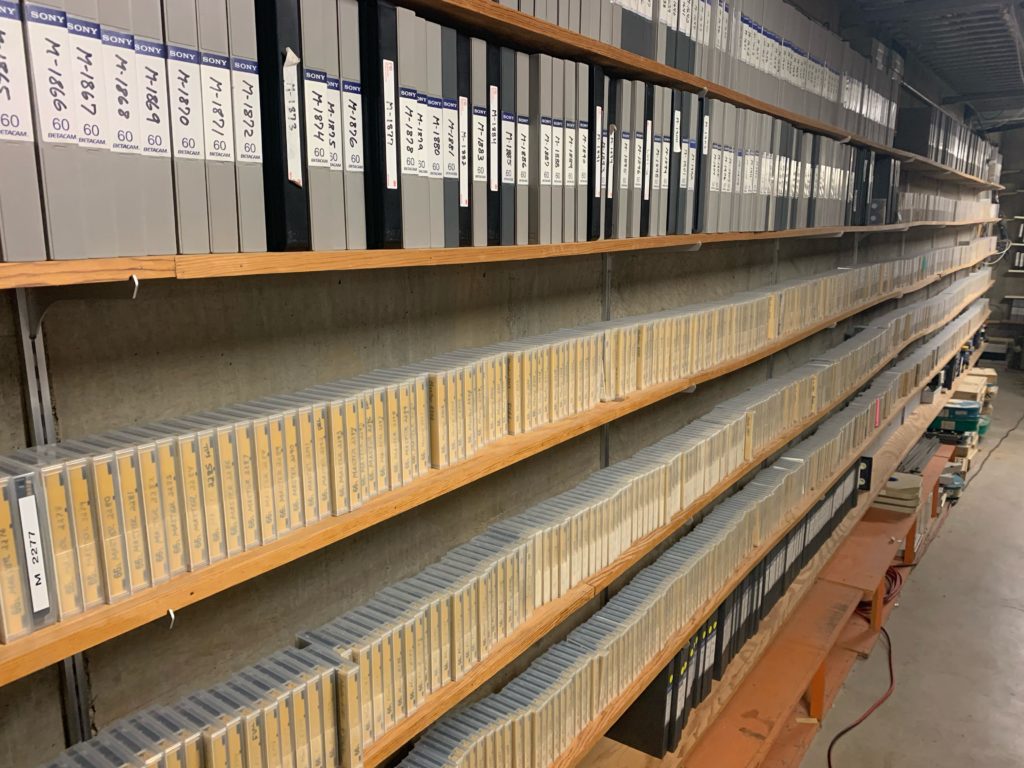Digitization of old videotapes from two Iowa TV stations is underway. One project involving KWWL-TV in Waterloo is about 70 percent complete, while a similar process is just beginning at KCCI-TV in Des Moines.

KCCI part of Hearst project
KCCI-TV in Des Moines has started digitizing its file videotape and expects to finish by mid to late summer, according to Brian Sather, KCCI president and general manager. He’s unsure of an exact number but says there are “hundreds of tapes or more” with thousands of stories dating back to the 1970’s currently stored in the station’s morgue.
“It’s a floor to ceiling room of multiple shelves full of tapes. I think at one point we converted some film to tape, but now everything is on tape and we’re converting it to digital files,” Sather said.
The Hearst Corporation owns 33 TV stations including KCCI and is digitizing all video tapes company wide. KCCI is the second station in the project. Sather says Hearst purchased equipment to convert the old videotapes, then ships the equipment from one station to the next as each station is finished. Temporary employees are hired at each location to do the work.

The project will not only preserve the old news and sports stories, but it will also make it easier to find file footage. “This felt like the right time to digitize the video and ultimately put it into a database that’s searchable where we can surface it,” he said.
The public will not have access to the video. Sather says the video will be used on the station’s social media and digital platforms, as well as in newscasts. “There’s obviously a huge appetite for unique and new content and sometimes what’s old is new,” he said.
Archives digitizes KWWL tapes
KWWL donated 2,200 videotapes to the Archives of Iowa Broadcasting located at Wartburg College that include news and sports stories from 1978-1998. There are approximately 130,000 individual stories and programs on the tapes, Fred Ribich, interim director of the Archives, said.

Work to digitize the tapes began in 2019 after the Archives received a $165,000 grant from the National Endowment for Humanities, secured by former archivist Amy Moorman. The recordings cover news and sports events stories ranging from the OJ Simpson murder trial to eastern Iowa summer festivals, the Iowa State Fair, and the Waterloo Greyhound Racetrack, according to the grant application.
Ribich says the project should be finished by the end of the year. Originally the project was to have been completed a year ago, but the pandemic slowed the process because Wartburg students working on the project were not able to be there as much as planned.
Stories were first categorized, then the tapes were sent to an outside vendor for digitization. Students then began editing the digitized tapes into individual stories.
Jim McKernan, the regional vice president of Quincy Media (which owned KWWL at the time the project began) says, “Being able to preserve the tapes so that people can see a story rather than just reading about it is of immeasurable importance.” As an example, McKernan noted the station recently used footage of the Charles City tornado in 1968.
When the process is finished, the stories will be online and available not only for researchers but for the public and other TV stations. McKernan says the only requirement is that other stations give KWWL a credit when using the file video.
Ribich says the Archives currently receives an average of two or three requests a month from news outlets for videotape. He says the requests are from local and national news producers, including NBC “Dateline,” CBS “48 Hours,” and documentary producers from Discovery, A&E, and the History Channel.
“Being able to more efficiently search our collections for relevant material is a major plus in satisfying these inquiries. And what will be even more gratifying in the very near future is being able to provide a digitized file of the recorded material to those seeking materials of relevance,” Ribich said.
The Archives of Iowa Broadcasting was founded in 1994 by the late Grant Price, a long-time Iowa broadcast journalist and journalism professor at Wartburg.
The Archives hold thousands of papers and more than 28,000 audio tapes, videotapes, and film from TV and radio stations across the state. The Archives is also home to an Oral History Project of 115 videotaped interviews with Iowa broadcasters. In addition, there is a collection of old TV and radio equipment.